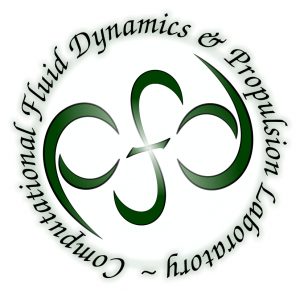COURSES
Dr. Gao’s Course List:
- MECH657: Advanced Computational Gas Dynamics
- MECH539: Advanced Fluid Mechanics
- MECH344: Fundamentals of Heat and Mass Transfer
- MECH680A5: Fundamentals of Computational Gas Dynamics
- MECH680A6: Advanced Computational Gas Dynamics
- MECH557: Turbomachinery
- MECH447: Algorithms in Scientific Computing
- MECH552: Computational Fluid Dynamics
- MECH778 Advanced Computational Modeling
Dr. Guzik’s Course List:
- MECH342: Mechanics and Thermodynamics of Flow Processes
- MECH551: Physical Gas Dynamics
- MECH480A6: Compressible Flow
- GRAD510: High Performance Computing
MECH657: Advanced Computational Gas Dynamics
The textbook: Fundamental Algorithms in Computational Fluid Dynamics, T. H. Pulliam and D. W. Zingg, Springer, 2014.
Course Description: Introduction to high-resolution finite-volume methods for solving high-speed inviscid and viscous compressible flows. Additional topics include an implicit finite-difference algorithm, an explicit finite-volume algorithm with multigrid, and a parallel adaptive mesh refinement (AMR) scheme.
Course Objectives: Upon completion of this course, students will
- Apply the high-resolution Godunov-type finite volume method to solve for compressible gaseous flows
- Develop and implement high-resolution numerical schemes using C++ and FORTRAN in a parallel computing environment
- Compare and evaluate several algorithms – an implicit finite-difference algorithm, an explicit finite-volume algorithm with multigrid, and a Godunov’s method
Course Outline: Advanced topics in the development of numerical algorithms for compressible gas dynamics are covered, including
- Review Fundamentals of Computational Gas Dynamics
- Governing Equations for Compressible Flows
- An Implicit Finite-Difference Algorithm
- Generalized Curvilinear Coordinate Transformation
- Thin-Layer Approximation & Spatial Differencing
- Implicit Time Marching and the Approximate Factorization Algorithm
- Boundary Conditions
- Multi-Dimensional Algorithm
- An Explicit Finite-Volume Algorithm with Multigrid
- Inviscid and Viscous Fluxes & Artificial Viscosity
- Iteration to Steady State
- High-Resolution Upwind Schemes
- Godunov’s Method & Roe’s Approximate Riemann Solver
- High-Order Reconstruction
- Total-Variation-Diminishing Schemes with Limiters
- Adaptive Mesh Refinement Scheme
MECH539: Advanced Fluid Mechanics
The textbook: Fundamentals of Compressible Flow, Brian Cantwell, available at RamCT to the students only.
Course Description: Development of the three-dimensional, non-steady, field equations for describing the motion of a viscous, compressible fluid; differential and integral forms of the equations; constitutive equations for a compressible fluid; the entropy equation; compressible boundary layers; area-averaged equations for one-dimensional steady flow; shock waves; channel flow with heat addition and friction; flow in nozzles and inlets; oblique shock waves; Prandtl-Meyer expansion; unsteady one-dimensional flow; the shock tube; acoustics in one-dimension; steady flow in two-dimensions; potential flow; linearized potential flow; lift and drag of thin airfoils.
Course Objectives: Upon completion of this course, students will be equipped with theories and analytical methods for furthering studies on compressible flow with more general flow geometry and real gas effects.
Course Outline:
- Fluid Flow Patterns
- Thermodynamics of Gases
- Control Volumes, Vector Calculus
- Kinematics of Fluid Flow
- Conservation Equations in Integral and Differential Form, the Navier-Stokes Equations
- Alternate Forms of the Equations of Motion, Rotational and Irrotational Flow
- Entropy Generation and Transport
- Viscous Flow along a Wall
- Quasi-One-Dimensional Flow, Shock Waves
- Gasdynamics of Nozzles
- Channel Flow with Area Change, Friction and Heat Addition
- Steady Waves, Oblique Shocks, Prandtl-Meyer Expansion
- Unsteady Wave Motion, Acoustics, Centered Expansions, the Shock Tube
- Linearized Potential Flow, Thin Airfoil Theory
Acknowledgment: We thank Prof. Brian Cantwell at Stanford University for giving his permission to Dr. Xinfeng Gao for using the course materials developed by Prof. Cantwell for “Fundamentals of Compressible Flow”.
MECH344: Fundamentals of Heat and Mass Transfer
The textbook: Fundamentals of Heat and Mass Transfer, 6th Edition
Course Description: An introductory course in heat and mass transfer, including topics in steady and unsteady heat conduction, free and forced convection for external and internal flows, heat exchangers, processes and properties of radiation, radiation exchange between surfaces, and mass transfer and dffusion.
Course Objectives: Upon completion of this course, the student will be able to
- Understand the basic concepts of conduction, convection, and radiation heat transfer, and convective and diffusive mass transfer
- Formulate and solve two-dimensional conduction heat transfer problems using both analytical and numerical approaches
- Delineate pertinent transport phenomena for any process or system involving heat transfer
- Design heat exchangers to optimize heat transfer
- Understand the relationship between fluid flow, convection heat transfer and mass transfer
MECH680A5: Fundamentals of Computational Gas Dynamics
The textbook: Fundamentals of Computational Fluid Dynamics
Course Description: Introduction to upwind finite-volume methods widely used in computational fluids dynamics for the solution of high-speed inviscid and viscous compressible flows. Topics include: Brief review of conservation equations for compressible flows; Euler equations; Navier-Stokes equations; mathematical properties of the Euler equations; primitive and conserved solution variables; eigensystem analysis; compatibility conditions; characteristic variables, Rankine-Hugoniot conditions and Riemann invariants; Riemann problem and exact solution. Godunov’s method; hyperbolic flux evaluation and numerical flux functions; solution monotonicity; Godunov’s theorem. Approximate Riemann solvers; Roe’s method. Higher-order Godunov-type schemes; semi-discrete form; solution reconstruction including least-squares and Green-Gauss methods; slope limiting. Multigrid solver.
Course Objectives: Upon completion of this course, the students will understand fundamentals and gain skills in the development of computational fluid dynamics algorithms. They will be capable of using mathematical tools to investigate a variety of algorithms whose applications range from laminar incompressible flow to hypersonic turbulent flow. Students are expected to develop an in-depth understanding of the high-resolution upwinding methods and stability analysis of high-order time stepping schemes. Students will develop codes using C++ and FORTRAN.
MECH680A6: Advanced Computational Gas Dynamics
Course Description: Introduction to high-resolution finite-volume methods for solving high-speed inviscid and viscous compressible flows. Additional topics include an implicit finite-difference algorithm, an explicit finite-volume algorithm with multigrid, and a parallel adaptive mesh refinement scheme.
Course Objectives: Upon completion of this course, the students will understand the high-resolution Godunov-type finite-volume method for compressible gaseous flows. They will be able to develop and implement high-resolution numerical schemes using C++ and FORTRAN in a parallel computing environment.
MECH557: Turbomachinery
The textbook: Fluid Mechanics, Thermodynamics of Turbomachinery, S. L. Dixon, Pergamon Press, 6th edition, 1998.
Course Description: This course is designed for senior undergraduate and graduate students, who are interested and/or involved in the design and operation of turbomachines in aerospace, global power, oil & gas and other industries. Topics include: Dimensional analysis; Two-dimensional cascades; Axial-flow turbines, compressors and ducted fans; Three-dimensional flows in axial turbomachines; Centrifugal pumps, fans, and compressors; Radial flow gas turbines; Hydraulic turbines; and Wind Turbines.
Course Objectives: Turbomachines (e.g. pumps, fans, blowers, propellers, compressors, and turbines) are used extensively in our daily life. Turbomachine applications include pumps in rocket engine, jet engines, gas turbines for thrust, electrical power generation, industrial blowers, air-conditioning fans, and computer cooling fans. Turbomachinery is a challenging and diverse field, with applications in many subsets of the mechanical engineering discipline, including fluid mechanics, combustion and heat transfer, dynamics and vibrations, as well as structural mechanics and materials engineering. In this class, we apply the concepts learned in fluid dynamics and thermodynamics to the design and performance prediction of turbomachines. Techniques presented in this class range from global analysis (e.g. performance curve and fan laws) to detailed analysis (e.g. radial equilibrium, throughflow solutions and 3D CFD calculations). This course is useful for engineers working directly with turbomachine design and those working with systems involving turbomachines.
MECH342: Mechanics and Thermodynamics of Flow Processes
The textbook: Fluid Mechanics, Frank White, McGraw-Hill, 7th edition.
Course Outline:
- Introduction: Concept of Fluid, Continuum, Dimensions and Units, TD Properties, Viscosity, General Techniques, Flow Patterns
- Pressure Distribution in a Fluid: Pressure and Pressure Gradients, Hydrostatic Distribution, Manometry, Hydrostatic Forces, Layers, Buoyancy
- Integral Relations for a Control Volume: Reynolds Transport Theorem, Mass Conservation, Linear Momentum, Energy Equation, Bernoulli Equation
- Differential Relations for a Fluid Particle: Acceleration Field, Mass Conservation, Linear Momentum, Energy Equation, Stream Function, Vorticity, Potential Flow, Navier-Stokes Equation
Course Objectives: Upon completion of this course, students will understand fundamentals and gain skills in analyzing fluid flows. At the end of the course, students will be able to
- Compute hydrostatic pressure distributions, and forces and torques due to hydrostatic pressure
- Implement control volume techniques to estimate unknowns of interest concerning mass, momentum, and energy in fluid flows
- Perform dimensional analysis and experimental scaling of fluid mechanics problems
- Analyze energy losses in laminar or turbulent pipe flows
- Analyze boundary layers
- Analyze potential flows
- Analyze shock waves in compressible flows

